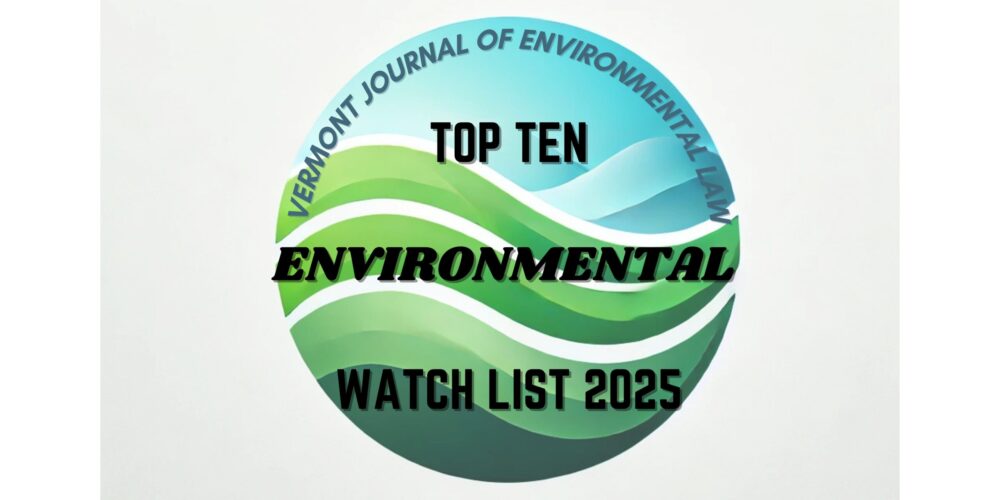
About Top 10
Each year, the Vermont Journal of Environmental Law publishes 10 articles that are considered the “Top 10” most pressing environmental law issues of the year. These articles are co-authored by 10 of our Senior Staff Editors and their selected VLGS faculty member. Vermont Law Review Senior Staff Editors also participated in writing this year. Senior Staff Editors typically select a faculty member that has extensive knowledge or experience in the field they are looking to write about. Over the course of the fall semester, Senior Staff Editors and their faculty co-author will meet and draft an article incorporating the anticipated effects of a particular environmental issue as well as providing creative solutions to that issue. Through this collaborative writing assignment, students have the opportunity to further refine their writing and researching skills. This publication serves as a vital resource for practitioners, policymakers, and academics navigating the rapidly evolving field of environmental law.

Home Sales and Water Levels are On The Rise in Flood Zones
VJEL Senior Staff Editor: Abigail Bailey
VLGS Faculty Co-Author: Dr. Guanchi Zhang
Rising sea levels in the U.S. are exacerbating housing inequities. Homes in flood zones are increasingly sold to vulnerable buyers under misleading conditions. Wealthy, older individuals often purchase these properties for short-term enjoyment, while low-income buyers face disproportionate risks, including hidden costs like flood insurance and repair expenses, often leading to foreclosure. The federal government, particularly HUD, plays a troubling role in perpetuating this cycle by selling high-risk properties without adequate disclosures, shifting the burden of financial and emotional losses to those least equipped to bear them.

Biogas’ Toxic Relationship with CAFOs: How Reliance on this Fuel Source Engenders Harmful Animal Farming Practices
VJEL Senior Staff Editor: Alex Hume
VLGS Faculty Co-Author: Delcianna Winders
Concentrated Animal Feeding Operations (CAFOs), or factory farms, maximize food production but at significant environmental and ethical costs, including animal mistreatment, pollution, and harm to vulnerable communities near these facilities. Biogas, a byproduct of animal waste, is framed as a renewable energy source but often exacerbates the environmental damage caused by CAFOs, as policies promoting biogas can unintentionally encourage CAFO expansion. To mitigate these harms, stricter regulations and alternative solutions are needed to reduce reliance on CAFOs and prevent further environmental and social injustices.

Stuck in the Weeds: How the Next Farm Bill Impacts the Environment
VLR Senior Staff Editor: Andrew Hockenberry
VLGS Faculty Co-Author: Emma Scott
The Inflation Reduction Act (IRA) allocated $19.5 billion for climate-smart agricultural practices, but with its funding set to expire in 2026 and the 2024 Farm Bill negotiations stalled, Congress faces a decision on whether to maintain these climate-focused requirements. Republicans favor rolling IRA funds into broader conservation programs without climate-smart restrictions, arguing they complicate farming practices, while Democrats see the requirements as crucial for addressing climate change. The 2024 elections, which gave Republicans control of Congress and the White House, may lead to budget reconciliation efforts that reshape conservation spending, potentially removing climate-focused guardrails and prioritizing broader agricultural practices.

The Urgent Need for Stricter PFAS Regulations to Safeguard Water Quality and Public Health
VJEL Senior Staff Editor: Ashton Danneels
VLGS Faculty Co-Author: Christophe Courchesne
PFAS, known as "forever chemicals," are persistent environmental pollutants linked to severe health risks. Under the Biden-Harris administration the EPA established stricter regulations, including new Maximum Contaminant Levels (MCLs) for drinking water and the designation of two PFAS as hazardous substances under CERCLA. These measures mark progress, but environmental advocates argue for broader, more comprehensive regulations, such as addressing PFAS as a class and incorporating them into the Clean Water Act to prevent contamination at its source. Despite these efforts, ongoing legal challenges, potential regulatory rollbacks, and the high cost of remediation underscore the need for sustained federal and state action to protect public health, especially in vulnerable communities.

Is Loper Bright a Red Herring? Why Ohio v. EPA Could Be Dangerous for Environmental Federal Agencies
VJEL Editor-in-Chief: Christina Karem
VLGS Faculty Co-Author: Laurie Beyranevand
The 2024 term of the U.S. Supreme Court brought transformative rulings in administrative law, notably overturning Chevron deference in Loper Bright Enterprises v. Raimondo and narrowing agencies' rulemaking authority in Ohio v. Environmental Protection Agency. While Loper Bright limits judicial deference to agency statutory interpretation, Ohio v. EPA signals stricter judicial scrutiny of substantive regulatory decisions, raising concerns about the future of science-based environmental governance. Together, these cases redefine the balance of power between courts and agencies, leaving regulatory entities in a precarious position as they navigate heightened judicial oversight and ambiguous legislative mandates.

Superfund Me: A High-Level Overview of Climate Change Superfund Bills
VJEL Senior Staff Editor: Erin Evans
VLGS Faculty Co-Author: Dayna Smith
Recent state-level "Climate Superfund" laws aim to hold major fossil-fuel companies accountable for climate change costs by applying a polluter-pays principle. Vermont and New York have enacted such legislation, requiring large contributors to climate change to fund state-level adaptation and mitigation efforts, with other states exploring similar measures. These laws, modeled after the federal CERCLA framework, face significant legal challenges from fossil-fuel companies but could signal a transformative shift in climate liability and accountability.

AI Is Mining More Than Data
VLR Senior Staff Editor: Hadley Chance
VLGS Faculty Co-Author: Mia Montoya Hammersley
Artificial Intelligence (AI) relies heavily on hardware made from critical materials like copper, driving increased mining that harms the environment and marginalized communities. The growing demand for copper, spurred by AI's expansion, raises concerns about water contamination, destruction of sacred Indigenous lands, and unsustainable energy and water use for server operations. While efforts like the EPA’s proposed studies and UNESCO’s ethical guidelines aim to address these issues, unchecked AI development risks escalating environmental degradation, human rights violations, and global waste challenges

Unseen and Unprotected: The Ongoing Struggle of Climate Refugees in the United States
VJEL Senior Staff Editor: Isaiah Gonzales
VLGS Faculty Co-Author: Siu Tip Lam
The accelerating impacts of climate change are displacing millions, yet U.S. asylum law lacks provisions to protect climate refugees. While international efforts like the Paris Agreement and COP27’s loss and damage framework highlight the need for action, the U.S. must amend its Immigration and Nationality Act to formally recognize climate-induced displacement and establish a visa category for climate refugees. By aligning domestic immigration policy with global commitments, the U.S. can address the humanitarian crisis of climate migration and uphold its responsibility as a major contributor to climate change.

Psilocybin-Assisted Therapy in the Green Mountain State
VJEL Senior Staff Editor: Kathryn Keener
VLGS Faculty Co-Author: Diana Csank
Recent legislative developments in Vermont and other states reflect growing interest in psilocybin's potential for mental health treatment. In Vermont, this includes the recent establishment of the Psychedelic Therapy Advisory Group (PTAG). While psilocybin remains a federally controlled Schedule I substance, studies from institutions like Johns Hopkins suggest its promise in treating conditions like depression, PTSD, and addiction. Still regulatory hurdles and high costs impede access to treatment. Despite PTAG's cautious stance, decriminalization and therapeutic programs in states like Oregon and Colorado signal a slow but steady shift toward broader acceptance and accessibility of psilocybin-assisted therapy.

Rejecting False Solutions: The Inflation Reduction Act and the Fight for a Just Energy Transition
VJEL Senior Staff Editor: Savannah Collins
VLGS Faculty Co-Author: Mia Montoya Hammersley
In 2024, scientists confirmed that global warming surpassed 1.5 degrees Celsius for a full year, underscoring the urgency of transitioning to renewable energy while addressing corporate greenwashing and false solutions. Despite unprecedented funding for renewable energy projects through the Inflation Reduction Act (IRA), many initiatives, such as carbon capture, continue to perpetuate environmental injustices and disproportionately impact frontline communities, including Indigenous Peoples whose lands are targeted for resource extraction. A Just Transition demands prioritizing local community benefits, Tribal self-determination, and equitable economic opportunities, ensuring that the shift to clean energy rectifies past harms and avoids replicating the injustices of the fossil fuel economy.
